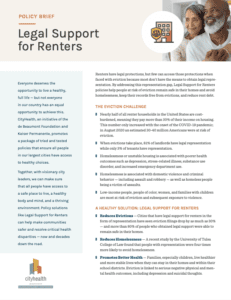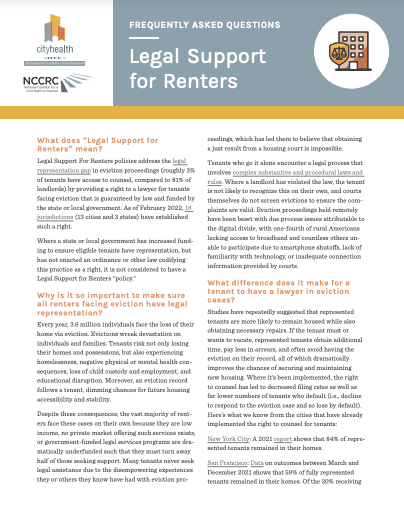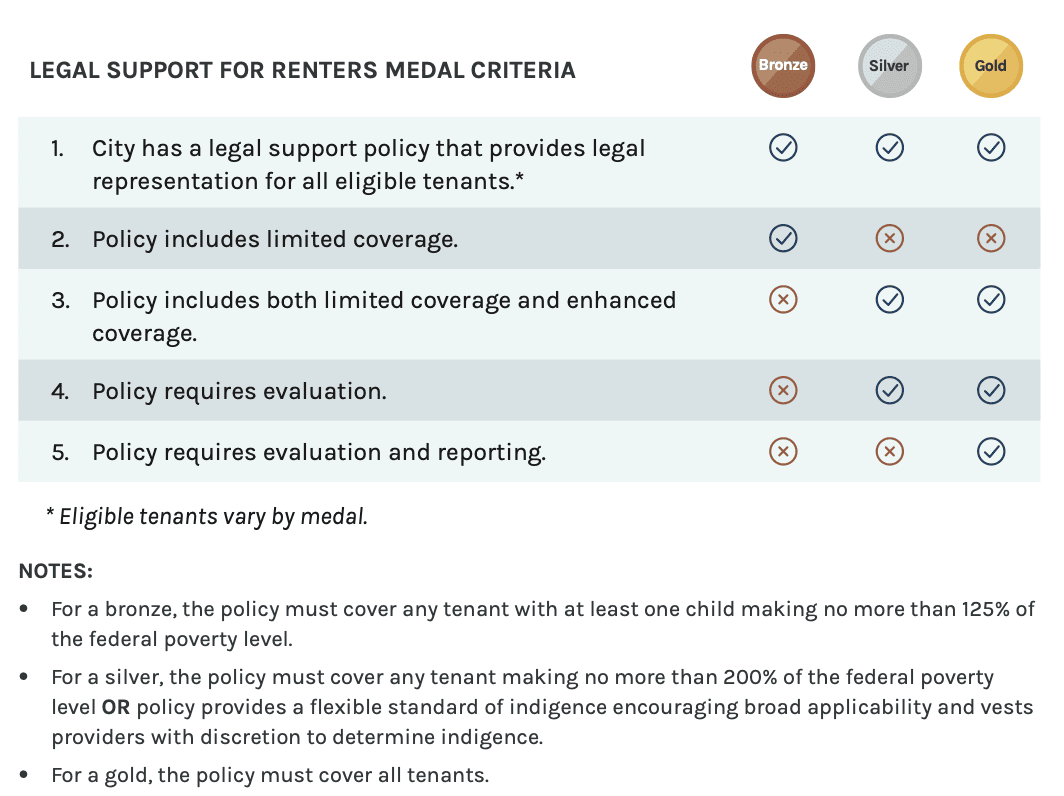This is the fourth blog in CityHealth’s monthly series exploring the 2.0 policy package. Sign up for our newsletter to learn about CityHealth’s policy solutions, tools, and resources.
Imagine you have just been served an eviction notice. Will you have to move, and if so, how will you afford it? What happens if you can’t find a home you can afford in time, or at all? Will this disrupt your child’s ability to get to school or stay healthy? Will you face legal fees?
Across the country, millions of at-risk renters confront these questions — and this precarious situation has only been compounded by the economic repercussions of the COVID-19 pandemic. During this housing crisis — which has disproportionately impacted low-income renters and renters of color — city leaders can adopt local policies that protect the right to a safe and stable place to live.
This month, we’re continuing our blog series exploring CityHealth’s 2.0 policy package with a look at Legal Support for Renters. These policies can help people at risk of eviction maintain housing stability and avoid homelessness. For many renters, this means staying in their homes, while for others (especially those who no longer want to remain), it means obtaining the necessary time to move, keeping their records free from evictions, and reducing rent debt. Together with Affordable Housing Trusts and Healthy Rental Housing, these policies form CityHealth’s housing policy platform that can help residents live healthy, full lives.
The Challenge
A safe and affordable place to live is an essential ingredient to living a healthy life. Eviction and forced housing displacement have adverse impacts on both physical and mental health, with research linking eviction to increased childhood hospitalizations, feelings of hopelessness, and higher mortality rates (including suicide) in adults. Eviction can also affect many other social determinants of heath, often compounding negative health outcomes.
The loss of one’s home negatively affects renters’ current economic security and future economic mobility, often forcing evicted tenants to live in substandard housing in under-resourced neighborhoods to offset costs. Housing insecurity is also linked to increased incidences of domestic abuse and sexual assault, exposure to adverse childhood experiences, and community violence, while housing stability supports individuals’ ability to live and work in safe environments and care for their families.
These outcomes, like most socially-determined health risks, are not shared equally. A recent study found that between 2012 and 2016, Black renters experienced the highest rates of evictions, and Black and Latinx women faced higher eviction rates than their male counterparts. People with mental illnesses and LGBTQ+ people were also disproportionately affected by evictions. Policies that prioritize equity are critical to addressing these disparities.
Tenants are notoriously disadvantaged when it comes to accessing legal representation. On average, data from the National Coalition for a Civil Right to Counsel suggest that landlords are represented at 81% of eviction proceedings, compared to just 3% of tenants. Lack of representation can put tenants at a substantial disadvantage; a study by the National Center for State Courts that looked across all civil cases found that plaintiffs were twice as likely to win cases when only their side was represented by counsel. Legal representation in court can make the difference when it comes to tenants being able to stay in their homes and avoid homelessness or other disruptive displacement.
The Solution: Legal Support for Renters

Download our Legal Support for Renters policy brief
Policies that provide Legal Support for Renters are proven to support vulnerable renting populations by increasing housing stability and limiting the risk of harm to evicted or displaced tenants. These policies allow cost-burdened renters to seek legal representation in eviction cases that often involve landlord harassment, housing discrimination, or lack of property upkeep, and access to counsel substantially improves the likelihood that tenants will be able to remain in their homes.
Legal Support for Renters policies can also increase the amount of time that renters have to locate new housing if they have or want to move, help keep their eviction records clean, and minimize the amount they owe in unpaid rent, which can help increase their ability to secure new housing. Policy interventions that provide renters with legal representation can significantly reduce the negative health outcomes associated with eviction and homelessness.
Tenants who reside in cities and states that have implemented Legal Support for Renters policies fare markedly better than tenants in areas without these policies. In 2017, New York City passed “right to counsel legislation” (Intro 214-b) that guaranteed representation in housing court to all New Yorkers living at or below 200% of the federal poverty line. Since then, access to legal representation has steadily increased for tenants, from just 1% in 2013 to 71% in 2021. The rate of eviction in New York City has dropped by 41% since Intro 214-b was passed, and 84% of households that received counsel were able to remain in their homes.
Interventions in other cities have had similarly impressive outcomes. In San Francisco, the 2018 “No Eviction Without Representation Act” resulted in a 10% decrease in eviction filing rates in just one year, and 67% of tenants who received counsel were able to remain in their homes. In Cleveland, recent legislation has helped 93% of represented tenants avoid eviction.

Want to learn more? Check out our Legal Support for Renters FAQ
City leaders are also finding economic benefits from policies that provide Legal Support for Renters policies. In Baltimore, where the rate of eviction is more than twice the national average, one study estimated that a $5.7 million investment in legal assistance for tenants could yield $35.6 million in benefits to the city and state.
Implementing policies that offer renters with legal support is a critical tool to address America’s housing crisis. High eviction rates are closely tied to housing unaffordability, and evictions can curtail tenants’ future access to safe, sustainable housing. The cornerstone of every healthy community is the emotional and physical well-being of its residents, and policies like these can help set the foundation that allows all people to live full, healthy lives.
Earning CityHealth Gold
In December 2022, CityHealth will release its first assessment of the nation’s 75 largest cities on their Legal Support for Renters policies. Cities can earn a gold, silver, or bronze medal based on how the city performs on five key criteria:

CityHealth is a resource for city leaders, policymakers, and advocates pursuing policy change that can help all residents live healthy, full lives. Have a question about Legal Support for Renters or any of our other policies? Please feel free to send us an email, and join us to learn more about the tools, research, and technical assistance opportunities from CityHealth and our partners.



 Katrina Forrest, J.D., is Co-Executive Director of CityHealth. Learn more about Katrina
Katrina Forrest, J.D., is Co-Executive Director of CityHealth. Learn more about Katrina  Catherine Patterson, MPP, is Co-Executive Director of CityHealth. Learn more about Catherine
Catherine Patterson, MPP, is Co-Executive Director of CityHealth. Learn more about Catherine 

